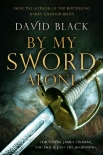By My Sword Alone David Black (best story books to read txt) 📖

- Author: David Black
Book online «By My Sword Alone David Black (best story books to read txt) 📖». Author David Black
He had reined Estelle in, and halted, and was yelling – so his throat felt about to tear – for the Dzików to form line on him. But he could barely hear even himself against the noise of battle. Where was his own bugler? Where was Casimir?
Then a bugle did sound; tinny and distant, but being belted out with great insistence.
But since it wasn’t close, he quickly shelved the knowledge of it at the back of his battle mind; there were other matters to attend to, closer by. He began waving his sabre as if doing so would somehow make him better heard. As he whirled and yelled, five dragoons rallied to him, one at a time, out of the murk; he gestured them to close up, stirrup to stirrup, and walked them forward again into the smoke and the melee. Then at the trot, until they were again trampling on Russian soldiery trying to bundle themselves out their way, not knowing whether to run or to stand and fight. The yelling and screaming, and only the odd pop of musketry now. But no more volleys; for an age, no volleys at all.
That was when James and his small gaggle hit against a solid wall of green coats three deep, the front rank kneeling, presenting their bayonet-fixed muskets, butts in the earth, points at an angle, pointing directly at his dragoons. No more than a dozen paces away. He could see the line in front of him clearly, but not where it ended – in either direction. The rear rank Russians, immediately to their front, then fired. A wave of powder smoke, and two Dzików went down. The rest were still standing, he couldn’t work out how. They were never going to break this line. They didn’t have the reach for their swords to slash down over the raised line of bayonets, presented by the men kneeling at the front, while all the men behind them had to do was load and fire, load and fire. At point blank range.
He yelled for the remaining dragoons to withdraw. He never knew if they heard him, for when he turned again in the smoke, he was alone; apart from the groaning men on the ground, tangling Estelle’s hooves.
The distant bugle was still blaring. Someone was sounding the charge, frantic and insistent – somewhere. With a chill that gripped his innards he realised he was completely disoriented. No idea in what direction his front lay or where the enemy were. Or his own lines. Just smoke, and noise that never dimmed.
He had no idea how long he sat there in the smoke, breathing hard so the powder seared his lungs, not knowing which way to ride, having lost in his exhaustion the power even to make a decision. Conscious only of Estelle’s reins in one hand, and his sabre in the other.
And then the volleys began again, behind him. Crashing out; then the reply. And again. Close. The Russian regiment and the grenadiers still slugging it out – it could only be them. Just as he knew the second volley, the reply, could only have come from the grenadiers. Much more feeble, ragged. They would not stand to take many more. He did not want to be caught up in their rout, so he wheeled Estelle and galloped in the opposite direction.
And suddenly he was in all but clear air; on the edge of the almost viscous clouds of burnt powder where there was only haze, and he could see for what seemed miles. Alas.
Soldiers were everywhere across the landscape, in blocked masses and running rabbles; no coherent shape he could work out in his first sweep of the visible battlefield. Only one thing seemed settled from this vista. He was not looking at his side’s victory.
To the east, towards the river, he could see grey-white uniforms streaming, disordered, from the smoke banks. Coming out of them at an angle, heading back up the Westerplatte, as if intent on forming up to march back to the Weichselmünde fortress. In front of him was just the same impenetrable wall of smoke. It was when he looked north west, towards the rising dunes and the tuft grass, that he felt his heart sink.
One vignette caught his eye above all the others. There was the Russian battalion, the one that had marched wide and blown apart his entire plan for the day. It had formed a neat infantry square. James had thought forming square had become an archaic manoeuvre in this era of modern war; too time-consuming on a fast-moving modern battlefield. Although God knows, nothing had seemed particularly fast moving on this battlefield; not until the very end, at least.
Forming square was a tactic from the last century; from the ancient world even, or so he’d read. It worked because if infantry in line, in the open, when attacked by cavalry, marched the flanks of their line back until they formed a box, or square, then with the soldiers’ bayonets facing out on all sides, they would be safe. At a stroke, cavalry were denied the advantage of taking the infantrymen from behind and breaking their ranks. But it was a complicated manoeuvre, and took time, especially under fire. So it was seldom practised in European armies, because in modern war an infantry line was usually 750 paces long. Too long for any head-on cavalry charge to ever overflow or envelop. Also, modern firepower meant any cavalry unit attacking such a line would have to face at least two, or possibly three, full volleys before it closed, and would be cut to ribbons.
But the





Comments (0)